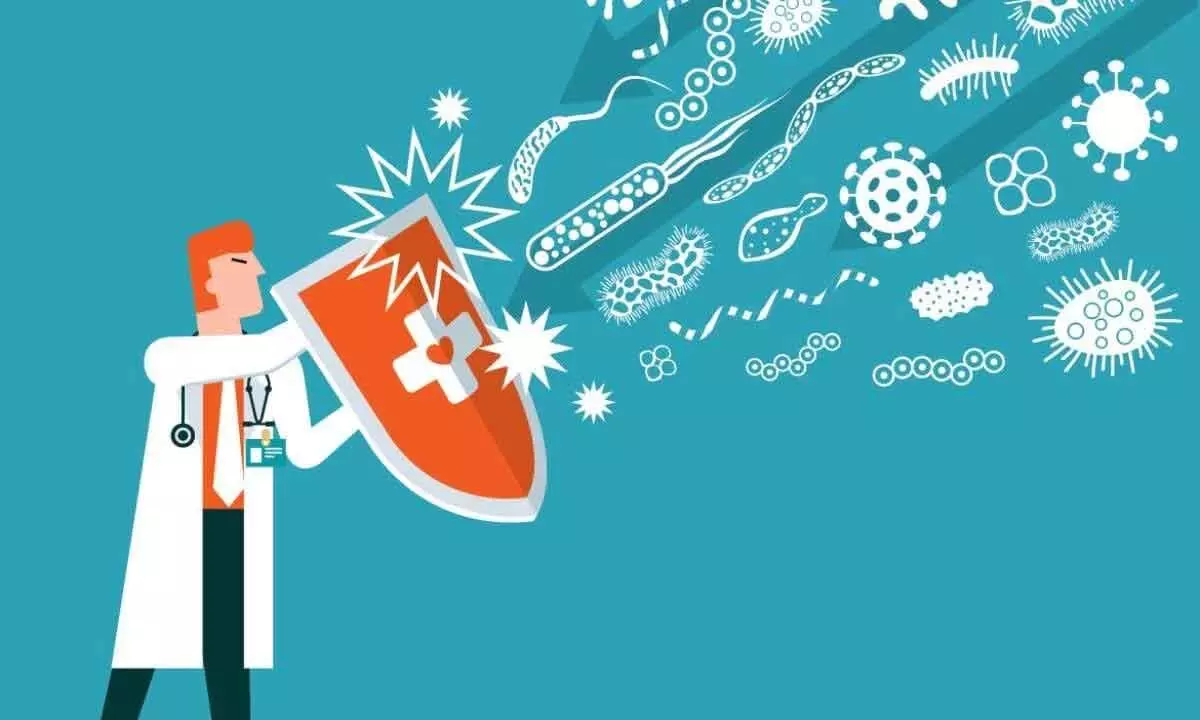Very few new antibiotics in the pipeline

This is signalling a dire public health emergency that needs global coordinated action to address the growing antibiotic resistance. Most antibiotics developed over the last decade are not novel enough and insufficient to treat multi-drug resistant bacteria. The global antibiotic pipeline for new antibiotics is weak, particularly against Gram-negative priority pathogens. Short-term scenario is bleak and long-term scenarios lack promise. Most big pharmaceutical companies who were developing antibiotics earlier have left the space and are now focussing on more profitable areas like cancer and rare diseases
According to a World Health Organization (WHO) database, of the 297 antibiotic medicines that are being researched on globally, only 77 are undergoing clinical trials. This is miniscule compared to over 10,000 for cancer, over 1,800 for neuropsychiatric conditions, and about 1,500 for endocrine, blood and immune disorders. Centre for Science and Environment (CSE) director general Sunita Narain says: “Antibiotics are getting increasingly ineffective. This silent pandemic of antimicrobial resistance is taking lives. What is more frightening is that not only are we not conserving the existing stock of medicines, the drug pipeline for new antibiotics is drying up.”
“In the years to come we are heading for a triple jeopardy: one, the antibiotics we know today would be increasingly ineffective; two, there would be no new antibiotics available; and, three, there would be a critical need for access to these medicines for all,” Narain added. Narain is a member of the Global Leaders Group on Antimicrobial Resistance (AMR), an independent international advisory and advocacy body which has heads of states, ministers and government officials, civil society leaders, and representatives from the private organisations as its members.
CSE researchers have highlighted how the global antibiotic pipeline is weak across the pre-clinical and clinical development stages. They have analysed the clinical pipeline of 15 high-earning pharmaceutical companies to understand their R&D focus and the role of small and medium pharmaceutical companies. The assessment also covers incentives to support antibiotic R&D and what needs to be done further.
AMR, antibiotic resistance in particular, is a silent pandemic that is one of the biggest public health threats of current times. The misuse and overuse of antibiotics in humans, animals and crops is making antibiotics ineffective due to growing resistance in bacteria against antibiotics. About five million deaths worldwide were associated with antibiotic resistance in 2019.
Analysis of clinical pipeline of 15 high-earning companies revealed that of the total 1,007 candidates, only 13 are antibacterials which are developed by four companies. CSE researchers point out that a majority of antibiotic developers are small and medium scale companies. “These companies are struggling and need support,” says Rajeshwari Sinha of CSE. “Push incentives have challenges, but they are working. The main limitation of any push funding organisation is that they alone can’t do the job. More money is required but more importantly, coordination and collaboration is the key,” said Richard Lawson of CARBX (Combating Antibiotic Resistant Bacteria Biopharmaceutical Accelerator), which supports small and medium antibiotic developers.
Lesley Ogilvie of Global AMR R&D Hub pointed out that “despite progress we still have a fragmented pipeline and what we are really lacking is the predictability that would encourage the development of a more sustainable and healthier pipeline. We need to build more robustness and resilience in funding for the antibiotic development pipeline.” Global AMR R&D is a global partnership currently consisting of 17 countries, the European Commission and two philanthropic foundations.
Acknowledging the crisis with antibiotic R&D, James Anderson from IFPMA (International Federation of Pharmaceutical Manufacturers & Associations) said: “Currently, society and healthcare systems place a low value on antibiotics despite the public health risks of AMR, sending a clear signal to companies that investing in them is not a priority. The way to solve this is to improve the conditions through the use of incentives, and the world’s leading economies have a role to play in this.”
CSE researchers call for critical reforms to stimulate the antibiotic R&D ecosystem for a sustainable and equitable antibiotic access. There is a need for greater public financing, a coordinated response from national governments and striking the right balance in public-private partnership for antibiotic development. They have highlighted that antibiotics have attributes of a ‘global public good’ despite not fitting into the strictest definition.
“These life-saving antibiotics must be conserved, which means careful, restricted use, even if less money is made in sales. Access to these medicines is critical to be ensured: drugs will have to be affordable, which also limits the profit interest of pharmaceutical firms. So it is time to look at antibiotics as a global public good,” said Narain as she concluded the webinar.
















